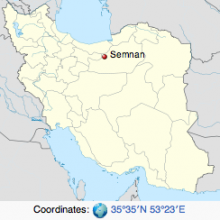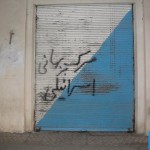The campaign against Iran’s Baha’is

Nobel Peace laureate and human rights advocate Shirin Ebadi helped represent seven members of a Baha’i group in Iran. (AFP photo/Martin Bureau)
Nobody was around to help them when the roads to their village were blocked and officials prohibited anyone from entering. Only trucks and at least four front-end loaders were allowed in. They had a mission: leveling the residents’ 50-plus homes. One homeowner, unaware of the situation, had somehow entered the village and was beaten.
They had been warned. They had appealed to the authorities for protection, but to no avail.
Nobody was ever held accountable.
Was it the West Bank? Was it Gaza?
No, this was northern Iran’s Ivel village, and the residents were Baha’i, a sizeable religious minority in the country.
The incident, which took place in June, is only part of a 30-year systematic campaign of harassment and persecution. Only after seven former members of Yaran, or “Friends” – a coordinating committee in charge of the community’s internal affairs – were arrested in March and May of 2008, did the “Baha’i question” begin to capture the attention of the international community. Despite international outcry, the five men and two women were each sentenced to 20-year jail terms in August for “actions against national security,” and for spying for Israel and America.
Nobel Peace laureate and human rights advocate Shirin Ebadi, together with colleagues from her Defenders of Human Rights Center, represented the seven Yaran members. The lawyers’ request to meet their clients or view their files was denied until the investigations were finalized, Ebadi told NOW Lebanon. “At that stage, they had already been detained for almost two years.”
“I myself read the file page by page, but there wasn’t even the slightest piece of evidence in the file that would support the prosecutor’s accusations. If they had been judged by a fair court, the verdict of their acquittal would have been instantly pronounced,” Ebadi said.
Ebadi has requested a revision of the case and repeatedly called for the Yaran members’ immediate release. Meanwhile, they were transferred to the notorious Gohardasht Prison in Karaj, 20 kilometers outside Tehran.
“In my opinion, the actual reason for arresting them is the fact that they are Baha’is and are not ready to abandon their beliefs,” Ebadi said.
With an estimated 350,000 followers, the Baha’i community is the largest non-Muslim religious minority in Iran, where the faith originated about 160 years ago.
While Article 13 of the Islamic Republic’s constitution recognizes Jews, Christians and Zoroastrians as minorities free to practice their religion, no mention of the Baha’is is made.
As they are not officially recognized as a religion, “unfortunately the Baha’i community in Iran has absolutely no rights,” Ebadi said. “They even have no right to enroll in universities [and] no right to employment, neither in the public sector nor in private companies.”
Iranian authorities and state-run media refer to the Baha’i faith as a “misguided sect,” even though the Baha’is make up the only non-Muslim religious community in Iran that recognizes the Prophet Mohammad as a messenger of God. Yet, the Baha’i belief that Baha’u’llah, the founder of the religion, is the latest in a never-ending series of divine messengers – succeeding Moses, Jesus and Mohammad – contradicts the Muslim belief in Mohammad as the last prophet.
The harassment of the community is not new. “Since the beginning of the Iranian Republic, the Baha’i leadership was either in prison or outside prison under surveillance,” said Mehdi Khalaji, a senior fellow at the Washington Institute for Near East Policy. “Many Baha’i leaders, over the past 30 years, were assassinated outside prisons or executed inside prison.”
But even prior to the establishment of the Iranian Republic, Baha’is have been subjected to waves of persecution. Around 20,000 Babis (predecessors of the Baha’i religion) and Baha’is were killed in Iran before the Islamic Revolution, and hundreds more were executed in the early 1980s. According to the Baha’i International Community, there are currently about 50 Baha’is imprisoned in Iran simply on account of their faith.
“The Iranian government, or clerics, since 150 years ago, [have tried] to portray the Baha’i faith not as a religion but as a foreign plot against Shiism. So they say that the Baha’i faith is a political sect created by the British and protected by Israel, and present this as the reason as to why the main center of the Baha’is is in Israel,” Khalaji said.
Baha’u’llah arrived in the town of Acre as a prisoner of the Ottoman Empire 60 years prior to the establishment of the state of Israel. For this reason, today the resting place of Baha’u’llah and the administrative center of the worldwide Baha’i community are located in the Jewish State.
“It has nothing to do with Israel historically,” Khalaji said. “They don’t want to admit that it is a religion.”
Against this backdrop, it is no surprise that “no lawyer dared to defend the Yaran” within a year of their arrest, said Ebadi, who took on the case on their families’ request and faced severe opposition. State-run newspapers harshly criticized her, asking how a Muslim dared defend Baha’is. Ebadi turned to Grand Ayatollah Hoseyn Ali Montazeri prior to his death in December 2009 for guidance.
Asked whether a Muslim could legally defend a Baha’i, he replied, “If you are certain that they are innocent, it is your duty to defend them by all means,” Ebadi said.
According to Professor Touraj Atabaki, head of the Department of the Middle East and Central Asia at the International Institute of Social History in the Netherlands, Iran’s “mass campaign orchestrated against the Baha’is,” while outwardly targeting this specific community, indirectly addresses other religious communities in the country. In Iran’s attempt to promote “homogenous Shiism,” the Baha’is are scapegoats, he said.
“The main problem the Iranian government is facing is to have a clear legal definition of who is Iranian, the definition of citizenship.” As long as religion remains the defining criterion of citizenship, Atabaki said, Baha’is are likely to remain the weakest among the victims of this policy.
Even before issuing a statement of support on Ebadi’s request, Ayatollah Montazeri, in an unprecedented move, issued a fatwa in May 2008 saying that even though Baha’is are “unbelievers,” they are entitled to the right of citizenship.
For Khalaji the question goes beyond citizenship rights. “We need the whole society to take the responsibility for what’s happening to the Baha’is. We need lots of work for introducing the Baha’i faith to Iranians… and make society understand that whether you believe in the Baha’i faith or not, you have to respect this faith as a religion.”
They had been warned. They had appealed to the authorities for protection, but to no avail.
Nobody was ever held accountable.
Was it the West Bank? Was it Gaza?
No, this was northern Iran’s Ivel village, and the residents were Baha’i, a sizeable religious minority in the country.
The incident, which took place in June, is only part of a 30-year systematic campaign of harassment and persecution. Only after seven former members of Yaran, or “Friends” – a coordinating committee in charge of the community’s internal affairs – were arrested in March and May of 2008, did the “Baha’i question” begin to capture the attention of the international community. Despite international outcry, the five men and two women were each sentenced to 20-year jail terms in August for “actions against national security,” and for spying for Israel and America.
Nobel Peace laureate and human rights advocate Shirin Ebadi, together with colleagues from her Defenders of Human Rights Center, represented the seven Yaran members. The lawyers’ request to meet their clients or view their files was denied until the investigations were finalized, Ebadi told NOW Lebanon. “At that stage, they had already been detained for almost two years.”
“I myself read the file page by page, but there wasn’t even the slightest piece of evidence in the file that would support the prosecutor’s accusations. If they had been judged by a fair court, the verdict of their acquittal would have been instantly pronounced,” Ebadi said.
Ebadi has requested a revision of the case and repeatedly called for the Yaran members’ immediate release. Meanwhile, they were transferred to the notorious Gohardasht Prison in Karaj, 20 kilometers outside Tehran.
“In my opinion, the actual reason for arresting them is the fact that they are Baha’is and are not ready to abandon their beliefs,” Ebadi said.
With an estimated 350,000 followers, the Baha’i community is the largest non-Muslim religious minority in Iran, where the faith originated about 160 years ago.
While Article 13 of the Islamic Republic’s constitution recognizes Jews, Christians and Zoroastrians as minorities free to practice their religion, no mention of the Baha’is is made.
As they are not officially recognized as a religion, “unfortunately the Baha’i community in Iran has absolutely no rights,” Ebadi said. “They even have no right to enroll in universities [and] no right to employment, neither in the public sector nor in private companies.”
Iranian authorities and state-run media refer to the Baha’i faith as a “misguided sect,” even though the Baha’is make up the only non-Muslim religious community in Iran that recognizes the Prophet Mohammad as a messenger of God. Yet, the Baha’i belief that Baha’u’llah, the founder of the religion, is the latest in a never-ending series of divine messengers – succeeding Moses, Jesus and Mohammad – contradicts the Muslim belief in Mohammad as the last prophet.
The harassment of the community is not new. “Since the beginning of the Iranian Republic, the Baha’i leadership was either in prison or outside prison under surveillance,” said Mehdi Khalaji, a senior fellow at the Washington Institute for Near East Policy. “Many Baha’i leaders, over the past 30 years, were assassinated outside prisons or executed inside prison.”
But even prior to the establishment of the Iranian Republic, Baha’is have been subjected to waves of persecution. Around 20,000 Babis (predecessors of the Baha’i religion) and Baha’is were killed in Iran before the Islamic Revolution, and hundreds more were executed in the early 1980s. According to the Baha’i International Community, there are currently about 50 Baha’is imprisoned in Iran simply on account of their faith.
“The Iranian government, or clerics, since 150 years ago, [have tried] to portray the Baha’i faith not as a religion but as a foreign plot against Shiism. So they say that the Baha’i faith is a political sect created by the British and protected by Israel, and present this as the reason as to why the main center of the Baha’is is in Israel,” Khalaji said.
Baha’u’llah arrived in the town of Acre as a prisoner of the Ottoman Empire 60 years prior to the establishment of the state of Israel. For this reason, today the resting place of Baha’u’llah and the administrative center of the worldwide Baha’i community are located in the Jewish State.
“It has nothing to do with Israel historically,” Khalaji said. “They don’t want to admit that it is a religion.”
Against this backdrop, it is no surprise that “no lawyer dared to defend the Yaran” within a year of their arrest, said Ebadi, who took on the case on their families’ request and faced severe opposition. State-run newspapers harshly criticized her, asking how a Muslim dared defend Baha’is. Ebadi turned to Grand Ayatollah Hoseyn Ali Montazeri prior to his death in December 2009 for guidance.
Asked whether a Muslim could legally defend a Baha’i, he replied, “If you are certain that they are innocent, it is your duty to defend them by all means,” Ebadi said.
According to Professor Touraj Atabaki, head of the Department of the Middle East and Central Asia at the International Institute of Social History in the Netherlands, Iran’s “mass campaign orchestrated against the Baha’is,” while outwardly targeting this specific community, indirectly addresses other religious communities in the country. In Iran’s attempt to promote “homogenous Shiism,” the Baha’is are scapegoats, he said.
“The main problem the Iranian government is facing is to have a clear legal definition of who is Iranian, the definition of citizenship.” As long as religion remains the defining criterion of citizenship, Atabaki said, Baha’is are likely to remain the weakest among the victims of this policy.
Even before issuing a statement of support on Ebadi’s request, Ayatollah Montazeri, in an unprecedented move, issued a fatwa in May 2008 saying that even though Baha’is are “unbelievers,” they are entitled to the right of citizenship.
For Khalaji the question goes beyond citizenship rights. “We need the whole society to take the responsibility for what’s happening to the Baha’is. We need lots of work for introducing the Baha’i faith to Iranians… and make society understand that whether you believe in the Baha’i faith or not, you have to respect this faith as a religion.”
To read more: http://www.nowlebanon.com/NewsArticleDetails.aspx?ID=202759&ref=nf#ixzz10kVZjyVv
Only 25% of a given NOW Lebanon article can be republished. For information on republishing rights from NOW Lebanon: http://www.nowlebanon.com/Sub.aspx?ID=125478




















